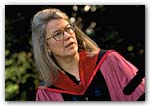
Main Menu ·
Search ·Current
Issue ·Contact ·Archives
·Centennial ·Letters
to the Editor ·FAQs


Academic research proceeds in its own quiet, quirky way. A historian
blows the dust off a book deep in the bowels of Widener Library and unearths
some new part of the past. A chemist combines compounds and comes up with
an unexpected result. One thing leads to another, explored at first with
a few colleagues, then explained--in language peculiar to the discipline--in
a journal.
Over time, or perhaps all of a sudden, some of that research captures the
imagination of a much wider circle-even of the public at large. When that
happens, it's doubly exciting: we learn something new, and we get a tantalizing
glimpse of how humans create knowledge. In this issue, we offer those twin
experiences twice, in articles about fields of inquiry spanning Harvard's
realms of research.
The cover feature, "Neighboring Faiths,"
rewrites the story of religion in America, the most religiously diverse
country on the planet. It could have been written only by Diana Eck, professor
of comparative religion
 |
Eck at Commencement
|
and Indian studies and director of the Pluralism
Project, which is producing a wholesale reevaluation of America's "georeligious"
reality. The text, delivered as the Phi Beta Kappa Oration during Commencement
week, bristles with surprising information (American Muslims outnumber Episcopalians
and Presbyterians, and may soon outnumber Jews). Eck suggests how living
in a visibly "marbled" world changes everything, from public policies
to our daily social interactions. Although she never set out to conduct
her research against a backdrop of public debate over affirmative action
and church burnings, listening to Eck talk about pluralism and tolerance
with those issues in mind was gripping. We think you'll find her text makes
equally stimulating reading.
At the Medical School, John Lauerman tells us, everything we've known about
human aging is being rethought ("Toward a Natural
History of Aging,"). For the first time, people are living long
enough to allow scientists to peer beyond the diseases of the aged to study
aging itself. What they find is lively cognition, unexpected vigor, and
entirely new approaches to care, treatment, and, of course, further biological
research.
In both cases, the paradigm is shifting. The earth is moving, as it always
does, and we have been afforded a new perch to see where we're going.
Speaking of moving: as this issue was being
printed, Laura Freid, Harvard Magazine's publisher for the past seven years,
headed down the road to assume exciting new challenges as Brown's vice president
for university relations. Freid strengthened the magazine financially, made
possible its adoption of new technologies, oversaw a large increase in circulation,
and helped ease the first change in the editorship in a generation. Her
stewardship served our readers well indeed.
~ John S. Rosenberg
Main Menu ·
Search ·Current
Issue ·Contact ·Archives
·Centennial ·Letters
to the Editor ·FAQs


